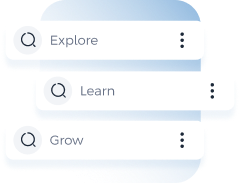
Refine Your Search
...
Explore Financial Academy
About the Academy
Discover our Rich, 60-Year Journey
Jadarat
A Comprehensive System for Skill and Knowledge Development
Governance
Meet our Inspiring Leadership
Success Stories
Check out our Clients’ Reviews and Testimonials


...


In today's work environment, emotional intelligence is a key factor that contributes to enhancing both personal and professional performance. The Emotional Intelligence Program for Professionals offers a unique opportunity to develop skills for managing emotions—whether your own or those of others.
People with high intelligence and mental abilities may not necessarily be successful in life. It is essential to possess emotional intelligence, or the ability to control feelings and emotions, in order to be successful and achieve personal development. The objective of this program is to provide participants with emotional intelligence skills that will enable them to understand their feelings, regulate them, deal with them positively, master communication, possess emotional competence, and get rid of negative emotions.
Banking
Capital Market
Insurance
Financing
+112
Personal Skills and Self-Development
Not Exist
Lecture
Case Studies +3
Lecture
Case Studies
Dialogue Teams
Role-play
Exercises and assignments
Pre Exam
Post Exam
All job families in the financial sector -
- +112
All job families in the financial sector -
-
-
-
-
-
-
-
-
-
-
-
-
-
-
-
-
-
-
-
-
-
-
-
-
-
-
-
-
-
-
-
-
-
-
-
-
-
-
-
-
-
-
-
-
-
-
-
-
-
-
-
-
-
-
-
-
-
-
-
-
-
-
-
-
-
-
-
-
-
-
-
-
-
-
-
-
-
-
-
-
-
-
-
-
-
-
-
-
-
-
-
-
-
-
-
-
-
-
-
-
-
-
-
-
-
-
-
-
-
-
-
-
-
This provides you with the opportunity to select the available times that suit you best for participation in our program. These times represent slots during which we are ready to welcome you and provide assistance and guidance.
In Class Training
?Why do we study emotional intelligence
The importance of emotional intelligence
The history of emotional intelligence
The story of emotional intelligence
?Emotional education where and when
The relationship between emotional intelligence and success
Explain the nature and trends of intelligence
Emotional intelligence definition and concept
Research and studies conducted on emotional intelligence
In Class Training
Prime factor theory of intelligence (Thurston)
and studies conducted on emotional intelligence
Motives of human behavior
Activate psychological standards
Components of emotional intelligence in terms of brain structure
Components of Emotional Intelligence (Mayer-Salovey)
Components of Emotional Intelligence (Golemen)
Self-awareness The Sense of Self (The Four Self-Pictures)
Johari window
In Class Training
Self-regulation
Forms of self-organization
Value extraction scale
Constructive Thinking (Lapstone)
Ways to control mood swings
Dealing with anger
Psychological sensitivity buttons
In Class Training
Self-motivation
Driving values
Stimulating Vision
Mission
Objectives
Practical exercises
In Class Training
Empathy
Social skills
Milestones of the plan to develop and activate emotional intelligence
Recognize the importance of emotional intelligence in personal communication and at work to deal with different life situations.
Using emotional intelligence to improve communication and interpersonal skills as a tool for building effective and enduring skills.
Having an accurate mechanism for identifying strengths and weaknesses and using them in drawing future plans
Understand the other party's challenges to help overcoming them that will build positive relationships with and influence others
Achieving harmony between emotional and mental intelligence to reach psychological balance and success in life.
